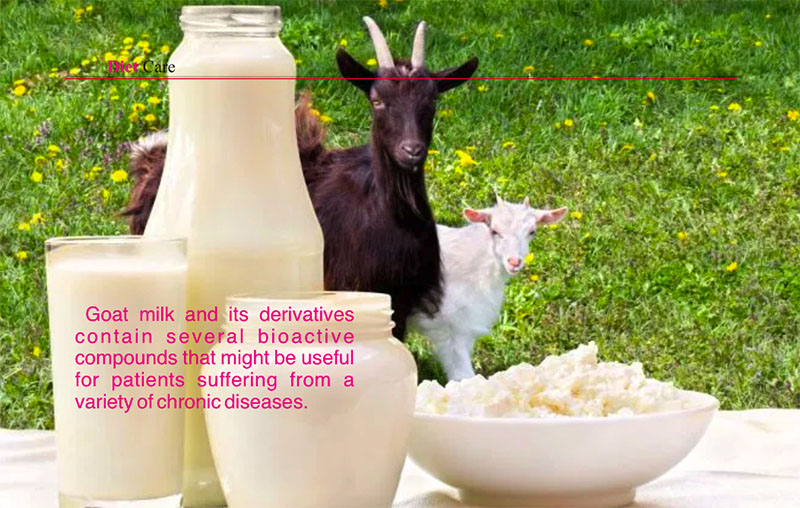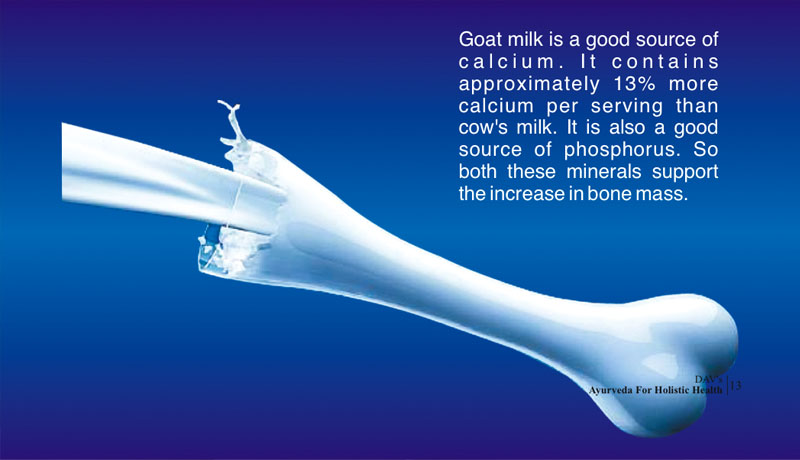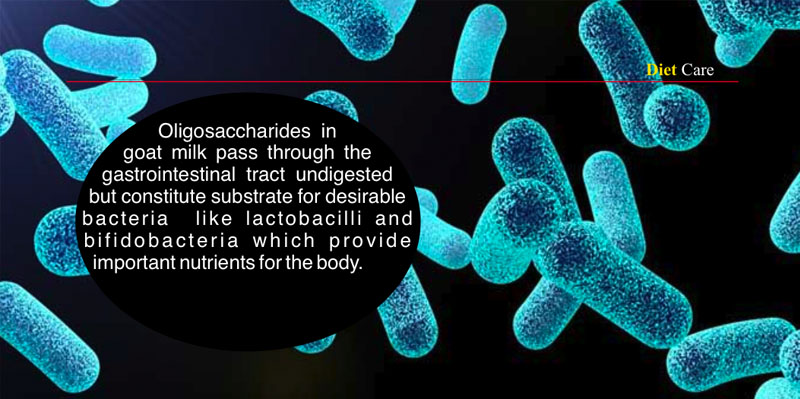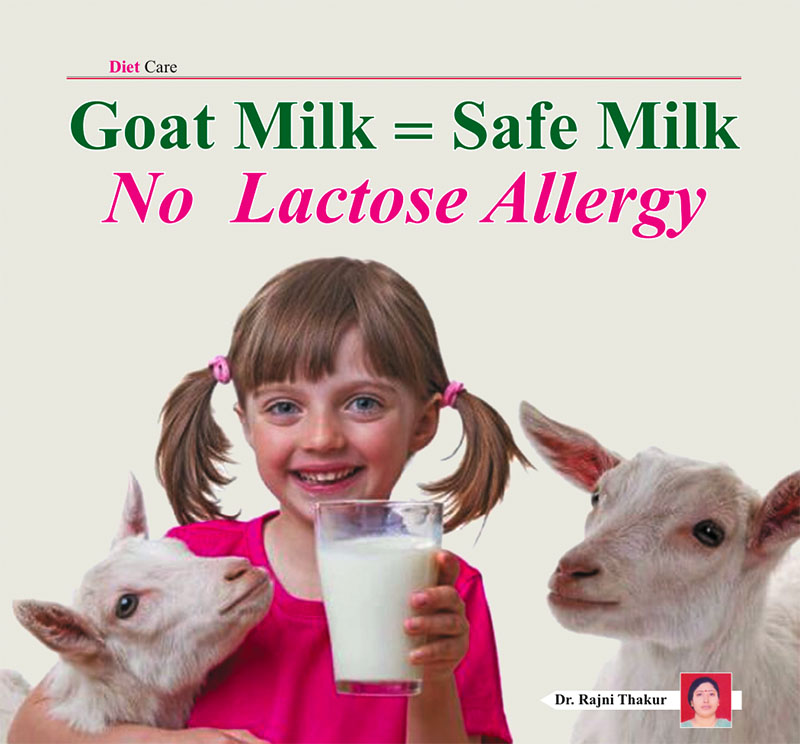Goats are important milk producers in several parts of the tropics and contribute significantly to human nutrition. Lower percentage of lactose than cow's milk make it favourable for people with lactose intolerance. Further it has higher percentage of prebiotics which helps nourish the beneficial bacteria living in our gut ecosystem. Ayurvedic texts have described the properties of different types of milk with their therapeutic uses. Generally the milk is sweet in taste, unctuous, coolant, increases ojas, nourishes the body, aphrodisiac and mitigates vata and pitta dosha. Goat milk is light and grahi. It is recommended in different diseases like tuberculosis, bleeding piles, diarrhoea, dysentary, leucorrhoea, bronchitis, asthma and nose bleed. It is also an ingredient in many ayurvedic formulations like anu taila for nose, kumkumadi taila for skin, mahatriphala ghrit for eyes, sarswata ghrit for developmental disorders, somnath rasa for urinary infections and pind taila for gout. It is also used for the purification of minerals that are recommended to cure the diseases. Livestock animals have always been the important source of milk. Bovine milk is by far the most commonly consumed milk because of large cattle population. In goat milk, the fat globules are smaller and have a greater surface area than those found in cow's milk. Smaller globules are more easily and nicely worked on by pancreatic lipase, the fat digesting enzyme. Goat milk is lower in lactose than cow's milk about 12% less per cup. People with lactose intolerance may find goat milk and its derivates best alternative.
Milk is considered as the important constituent of balanced diet. It is the first food for mammals and supplies all the energy and nutrients needed for the proper growth and development of body. For all mammalians, milk consumption ends at the weaning period except in humans who consume milk throughout their life. Livestock animals have always been the important source of milk. Bovine milk is by far the most commonly consumed milk because of large cattle population. However in certain parts of the world milk from other animal species has a significant share in consumption. The physical properties and composition of milk varies from species to species. Chemically milk is a complex oil in water emulsion which contains proteins, fats and carbohydrates and lower amount of minerals, enzymes, vitamins and immunoglobulins.

Milk contains casein, a protein found only in milk and contains all the essential amino acids. It accounts for 82% of total proteins in milk. It contains important minerals like calcium, phosphorous, magnesium and potassium. Phosphorous in milk plays an important role in calcium absorption and its utilization. Milk is also a significant source of vitamin B2 vitamin A and D. It contains lactose as a sugar. The milk composition differs due to genetic factors, mutational factors, frequency of milking and environmental conditions. The greatest change in composition occurs during lactation. The animals on superior nutritional feed produce more milk with a high level of fat and proteins than animals on lower nutritional feed. Different animals bear different composition of milk. Commonly cow and goat milk are consumed as healthy drinks. Both can be easily incorporated into the diet and offer a range of valuable macro and micro nutrients. Goat milk confers some additional health benefits with unique properties when compared to cow's milk. It is becoming the choice for health conscious people because of its easy to digest composition.
Importance of Goat Milk
Goat is one of the main sources of milk for human consumption. Goat milk differs from human milk and cow milk in both composition and nutritional properties. Goat milk and its derivatives contain several bioactive compounds that might be useful for patients suffering from a variety of chronic diseases. The oligosaccharides present in goat's milk have immuno modulatory properties, prevent attachment of bad bacteria and help the growth of good bacteria in the gut.

COMPOSITION OF GOAT MILK
Fat
Fat content is the variable component of milk depending upon season, lactation stage, genotype and feeding. Bovine, sheep, goat and human milk fat consists of 97-98% triglycerides and low level of phospholipids (0.5-1.5%) and free fatty acids (0.7-1.5%). The main characteristic of goat milk fat is the high content of short and medium chain fatty acids than those exhibited by cow's milk. Triglycerides with medium chain fatty acids in goat milk enjoy fast and efficient digestion and are excellent source of energy. In goat milk, the fat globules are smaller and have a greater surface area than those found in cow's milk. Smaller globules are more easily and nicely worked on by pancreatic lipase, the fat digesting enzyme.
Proteins
Proteins are essential for growth, development and repair of the body. The protein portion has a fundamental role on nutritional value of milk. Milk proteins are made of heterogenous groups and are divided into casein the main group of proteins and whey of lesser percentage. The Casein is of four types alpha S1 casein, alpha S2 casein, beta casein and kappa casein. Goat milk contains lower alpha S1 casein than cow's milk. Intolerance to milk is due to alpha S1 casein. So people who cannot tolerate cow's milk due to this protein can shift to goat's milk as it is better tolerated.
Due to low level of alpha S1 casein, the goat milk is softer and more easily broken down or curdled in the stomach. Due to this it is also suitable for children. When compared to cow milk, the goat milk has higher levels of amino acids.
Carbohydrates
Lactose is the main carbohydrate in milk. Goat milk is slightly lower in lactose than cow's milk about 12% less per cup. It becomes even lower in percentage when cultured into yogurt. People with mild lactose intolerance may find goat milk and its derivates best alternative.
Goat milk has another feature that outperforms cow's milk. It has the higher level of oligosaccharides (non digestible carbohydrate) with a similar amount and structure to those found in human milk.
Minerals
Goat milk is distinguished by its high chloride and potassium content. It is relatively low in sodium and high in calcium and phosphorus. It contains 13% more calcium per serving than cow's milk. It has lower concentration of iron, zinc and copper. Although goat milk has low iron concentration, it has a higher bioavailability than cow's milk due to the presence of higher amount of nucleotides (organic molecules) nearly equal to human milk that increases the absorption of iron in intestines.
Vitamins
Goat milk is an adequate source of vitamin A, thiamin, riboflavin and niacin. However it has lower level of folates, vitamin E and vitamin B12.
Health Benefits of Goat Milk
1. Prevents milk allergy
Cow's milk allergy is common in infancy and its prevalence is 2.5% during first 3 years of life. It is an Ig-E mediated allergy which means that our body produces IgE antibodies against some proteins in milk which trigger an immune response in the form of eczema, asthma, diarrhoea. Proteins alpha S1 casein and beta lactoglobulin are important allergens in cow milk allergy. Because the alpha S1 casein is low in goat milk, it can be the best alternative for those who are allergic to cow's milk.

2. Lowers blood pressure
The protein present in goat milk in the form of peptides has been thought to be involved in anti hypertensive effect. Angiotensin converting enzyme is one of the main regulators of blood pressure. The bioactivity of goat milk protein releases angiotensin converting enzyme inhibitory and antioxidant peptides from hydrolysed goat milk protein which act as antihypertensive and antioxidant. Goat milk is a good source of potassium, an essential mineral for maintaining normal blood pressure and heart function.
3. Anti inflammatory
Imbalance in oxidative and inflammatory status are involved in the etiology of several chronic diseases like ulcerative colitis and crohn's disease. The goat milk proteins have been demonstrated to transform the dynamics of mucus by influencing the mucin secretion and the number of goblet cells causing gut protection. The constituents of goat milk like lysozyme and transforming growth factors provide additional protection against intestinal inflammation. The goat milk has much higher level of growth factor activity than that of cow's milk making it nutraceutical for gastrointestinal disorders.
4. Antimicrobial
The antimicrobial activity of milk is attributed to the presence of immunoglobulins (the defense proteins) and other proteins such as lactoferrin and lysozyme. These antimicrobial peptides of goat milk protein improve the ability of natural defense to eliminate invading pathogens. They play an important role in both innate and adoptive immunity responses. Casein proteins in goat milk also perform good antimicrobial activity against gram -ve bacteria.
5. Cytomodulatory and anti-cancerous
Goat milk lactoferrin (protein) induces apoptosis (elimination of cancer cells during their development) in human cancer cells. It might be able to present protective activity against cancers.
6. Intestinal health
Lactose is the major carbohydrate in milk which is lower in goat than cow's milk. This water soluble sugar content is a valuable nutrient as it favors intestinal absorption of calcium, magnesium and phosphorus. Oligosaccharides, another type of carbohydrate in goat milk cannot be digested in human small intestines and pass through the large intestines where they promote growth of bifido bacteria beneficial to gut health. Goat milk oligosaccharides are the most similar to human milk oligosaccharides. These are able to reduce the pathogen binding to the intestinal mucosa. Certain bacteria are able to recognize oligosaccharides in milk and adhere to them reducing their adhesion to intestinal cells and also chances of infection. Thus the high amount oligosaccharides in goat milk as well as their structural profile place them under the best source of these carbohydrates.
Goat milk lacks folic acid and thus it is not recommended for infants under one year as it may cause anemia. So it must be supplemented with folic acid.
7. Prebiotic activity
A healthy gut micro biota of bifido bacteria and lactobacilli presenting saccharolytic activity possess multiple health benefits. These gut bacteria play a very important role in providing good digestive health and benefiting our immune system.
There are two ways to provide these healthy microbiota either administer them live as probiotics or as prebiotics that is the substances which pass through the gastrointestinal tract undigested but constitute substrate for desirable bacteria in the gut and these are oligosaccharides. These stimulate the development of lactobacilli and bifidobacteria which provide important nutrients such as vitamins, amino acids or short chain fatty acids which can then be absorbed.
8. Antiulcer activity
Goat milk is capable of neutralizing acids and toxins present in the body. It has distinct alkalinity and higher buffering capacity. It alkalizes the digestive system by increasing the pH level thereby preventing gastric ulcers. The soft curd of goat milk may be an advantage for adults suffering from gastro intestinal disturbances and ulcers.

Conclusion
Goat milk presents unique characteristics. Its composition is nearly same as cow's milk but it shows more similarity with human milk making it more easily tolerated. Morever the superior digestibility of goat milk, its fatty acid composition and the presence of bioactive compounds are helpful in the prevention and treatment of diseases.
Dr. Rajni Thakur
Associate Professor,
Department of Shalakya Tantra,
Dayanand Ayurvedic College, Jalandhar.
Mob.: 7973197093
drrajnidav@gmail.com







 Dec 2024
Dec 2024
 May 2024
May 2024
 September 2022
September 2022
 April 2022
April 2022
 October 2020
October 2020
 Jan 2020
Jan 2020
 June 2019
June 2019
 January-February 2019
January-February 2019
 Augest-September
Augest-September
 April 2018
April 2018
 November 2017
November 2017
 June 2017
June 2017
 November 2016
November 2016
 September 2015
September 2015
 March 2015
March 2015
 July 2014
July 2014
 January 2014
January 2014
 July2013
July2013
 March 2013
March 2013
 May 2012
May 2012
 May 2011
May 2011
 Sep 2010
Sep 2010
 Jun 2010
Jun 2010
 Feb 2010
Feb 2010
 December 2009
December 2009
 August 2009
August 2009
 June 2009
June 2009
 Feb 2009
Feb 2009
 December 2008
December 2008
 October 2008
October 2008
 March 2008
March 2008
 July 2008
July 2008
 May 2008
May 2008